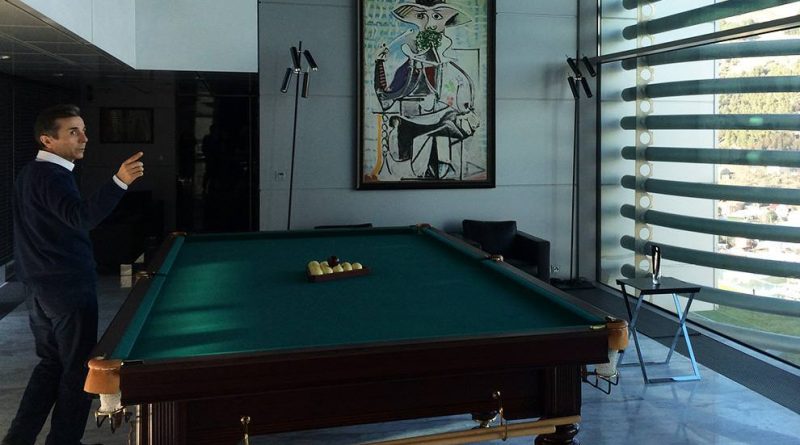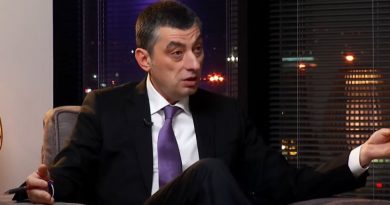Passion for Art or Cold Calculation: Is Ivanishvili Saving his Art Collection from Sanctions?

In January 2025, Georgia witnessed an unprecedented rise in art imports. Revenue Services’ online statistics calculate a total of $481 million worth of paintings was imported into the country. The “art boom” occurred at the same time oligarch Bidzina Ivanishvili’s relatives frantically re-registered companies in Georgia. It seems there’s one goal: to save his assets stored in the West.
Translated by Adrian Bader
Based on information from Georgia’s Revenue Services, art imports last month arrived in three large cases: two from the US and one from Great Britain. The total weight of the artworks combined was 6.6 tons. To give an idea of the scale, imports in January 2025 increased by 45%, totaling $1.6 billion. Without these imports, the total would have been around $1.1 billion, with annual growth of about 1.8%.
Beqa Liluashvili, a member of the opposition party For Georgia, directly pointed to the art as a possible link to Bidzina Ivanishvili. He suggested that the oligarch might be trying to evacuate his assets due to the risk of new sanctions.
“The only person in Georgia who can bring art worth half a billion dollars into the country is Bidzina Ivanishvili.”
In 2024, parliament, under Georgian Dream power, passed a law practically eliminating taxes on assets transported into the country by offshore companies. The document became the basis for legitimizing large financial transactions. Here are the main provisions of the law:
- Income/benefits that offshore companies or their individual partners receive from transferring assets into the country are exempt from income/profit taxes until January 1st, 2028.
- Assets coming into Georgia are exempt from import duties.
- Georgian enterprises are exempt from paying property taxes for assets received through offshore transactions until January 1st, 2030.
The approved law significantly lowers the costs of transporting assets into the country. For example, if an import duty is paid on art totaling 481 million dollars, the Georgian government receives about 242 million lari (about 130 million dollars)–the rough estimate based on standard tariffs for luxury items like artwork. Thanks to the change in law, people are now able to avoid these costs.
The deputies adopted this offshore law for exclusively one person–Bidzina Ivanishvili, critics said this spring. It has already been assumed that the oligarch is attempting to evacuate his financial assets to Georgia in case of Western sanctions. When American sanctions became a reality on December 27th, 2024, the evacuation process intensified.
The day before New Year’s Uta Ivanishvili, the billionaire’s son, registered from Japan a new company in Tbilisi–ATU Holding, with permission to manage 100 million lari (about 35 million dollars) in capital. And in January, Ivanishvili’s wife, Ekaterina Khvedelidze, founded the company Lusol, becoming sole owner.
According to Transparency International Georgia, by January 20th, Ivanishvili’s family had registered four new joint-stock companies. They then began transferring ownership rights from Georgian companies previously controlled through offshore accounts to the newly founded joint stock companies. The reregistration involved companies with significant authorized capital: 163,187,800 lari (about 58 million dollars).
But Bidzina Ivanishvili, according to observers, isn’t only evacuating his financial assets from Georgia. The native of the small village, Chorvila, is known not only as a businessman and politician but also as one of the biggest art collectors in the region. His collection was previously estimated by Austrian Business Insider to be worth one billion dollars. It contains works by Picasso, Kooning, Bacon, Schiele, Koons, and Hirst.
Ivanishvili sold part of his collection in 2016, worth about $112 million. Among those sold were the Willem de Kooning painting Unknown XXV for $66.3 million, Pablo Picasso’s Man with a Pipe for $18.4 million, and Francis Bacon’s Lying Woman with Hypodermic Syringe, No. 2 for $27.1 million.
The oligarch previously said that investing in art is one of the ways to build capital and preserve cultural heritage. According to him, “the same fate that ensues a collection of art is also a part of building capital.” A portion of the money from the collection’s selling has gone to the Cartu fund. “When the rest is sold, the funds will also be donated,” assured the billionaire.
His love of art may have become a convenient hobby under the pressure of sanctions. Many experts note that works of art are one of the easiest ways to avoid sanctions due to the difficulty in assessing their value.
The artworks’ transfer occurred as Great Britain pushed to expand its sanctions against Bidzina Ivanishvili. On January 10th, 2025, a member of the House of Commons, James MacCleary, submitted a motion to freeze the oligarch’s assets, a move already supported by 26 deputies. If the sanctions are adopted, they will affect all of Ivaishvili’s business empire, over 95 companies, many of which are registered in offshore accounts under the jurisdiction of Great Britain, including the British Virgin Islands and Jersey Island.
Sanctions will also limit Bidzina Ivanishvili’s access to the art market; starting May 2025, all financial sanctions by the United Kingdom can be applied to the sale of art valued over 10,000 euros. This means that auction houses and galleries will be required to check the origin of works and freeze assets if there’s a clear connection to sanctioned individuals.
This might then include at least one of the three large cases.




